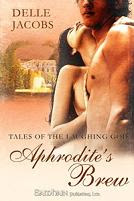 Welcome to the Riskies, Delle!
Welcome to the Riskies, Delle!
Thanks so much for inviting me to be a Risky For a Day! I love reading your blog, and it’s a real pleasure to be a part of it. I’ll have a signed ARC of my latest release, Aphrodite’s Brew, plus a little chocolate gift (not an Easter Bunny) for one of you at the end of the day. Just be sure to send me your email address so I can arrange shipping with you!
And while I’m promoting, let me drop a few lines about the Royal Ascot, which I’m coordinating this year. There’s lots of new information, so be sure to check it out on the Beau Monde website. It’s a fabulous contest, a great place to try out your Regencies, with terrific prizes, wonderful critiques and comments, and wonderful editors for the final round. Save money by entering electronically, or be traditional and send a paper entry. Unusual and cross-genre Regencies are encouraged, and fimalsts whose entries are outside the gsub-genres the final round editors would buy will be provided with an extra read by an editor who acquires that sub-genre. And all non-finalists’ names will be put into a drawing for several 50-page critiques for non-finaling entrants.
Enough of the soapbox. Onward to the questions now.
I’ll join you briefly on your soapbox before we both jump off to also encourage people to enter. I’m one of the writers who first published as a result of the contest! Now tell us about Aphrodite’s Brew.
 Aphrodite’s Brew is what I call my piece of fluff, although it really isn’t all that fluffy. I meant for it to be a Regency Romp, emphasis on the Romp. Comedy bordering on slapstick. Not a book to be taken seriously, just one to be fun. But by the second draft, my characters started to take on more angst, more depth, and the book had a different tone and blend than I had originally planned.
Aphrodite’s Brew is what I call my piece of fluff, although it really isn’t all that fluffy. I meant for it to be a Regency Romp, emphasis on the Romp. Comedy bordering on slapstick. Not a book to be taken seriously, just one to be fun. But by the second draft, my characters started to take on more angst, more depth, and the book had a different tone and blend than I had originally planned.
It’s just an ordinary restorative tonic for women that Sylvia, Lady Ashbroughton, makes and secretly sells to finance her beloved step-daughter’s entrance into society. She has no notion it has an entirely different effect on men. But the bachelors of the Ton are suddenly and eagerly rushing giddly off to Gretna Green and committing the unthinkable atrocity agaist bachelorhood .
 Word has it a love potion has fallen into the hands of the match-making mamas. The gay blades are all doomed. Val–Lord Vailmont, a man of science and reason who scoffs at magic, witchcraft and the like, vows to prove to his superstitious friends they are being duped. A wager ensues, and the embittered widower who has vowed never to marry again sets out to hunt down the perpetrator of the hoax. The clues lead his straight to Sylvia, and one look in her silver-green eyes sets his soul spinning as if he has just encountered a witch.
Word has it a love potion has fallen into the hands of the match-making mamas. The gay blades are all doomed. Val–Lord Vailmont, a man of science and reason who scoffs at magic, witchcraft and the like, vows to prove to his superstitious friends they are being duped. A wager ensues, and the embittered widower who has vowed never to marry again sets out to hunt down the perpetrator of the hoax. The clues lead his straight to Sylvia, and one look in her silver-green eyes sets his soul spinning as if he has just encountered a witch.
Sylvia needs no handsome earls prying into her life. If Val learns of her secret trade in potions, she will be ruined and her beloved stepdaughter will be deprived of her Season. Worse, the earl could uncover Sylvia’s most shameful secret—her weakness for handsome men like him. So she protects her fragile heart from him by concocting an old family charm to wear in a locket. But neither logic nor charms can combat the stubborn love that sweeps them into a whirl of unbridled passion.
And, from somewhere in the mists of time, a forgotten, nameless god is laughing.
I have a great video for Aphrodite’s Brew, full of my own art work. Check it out— I hope you enjoy it.
How hard was it to incorporate paranormal elements in a novel set in the early industrial/late enlightenment period?
I think it’s both easy and hard. Regency readers and writers often show great attention to detail and accuracy, sometimes to the point where we are almost writing non-fiction instead of romance. Paranormal, on the other hand, calls for suspension of disbelief on a large scale. But that’s the very premise of Aphrodite’s Brew: pitting fact and reason against mysticism, the unreal, ethereal elements no facts or logic can explain. The Regency period is perfect for this because it sits squarely between the ancient world of faith and belief in things ethereal and the modern world of science and rationality. I chose my two characters to represent the duality. Val doesn’t believe in much of anything that can’t be rationally explained, but Sylvia has roots deep in the past, perhaps, I’ve hinted, all the way back to the pre-literate ancient Celts. To me, this premise is like England itself, a modern industrial, literate land surrounded and deeply ingrained in its own long history.
 What do you love/hate about the Regency?
What do you love/hate about the Regency?
I don’t hate anything about it. The Regency was what it was, flaws and all. I think it’s easy to look back on the past and criticize. It would be hard to go back from the present and live in the past, but if we were born there with no knowledge of what the future would bring, we wouldn’t think it so bad. Just as in today’s world, we’d see things that ought not to be, and perhaps try to change them. And we’d look back at the previous generations and wonder how the could stand their primitive lives. There were things like slavery and lack of rights for women I would not want to live with, and I not be at all keen to go back any time before Pasteur. But if I didn’t know what germs were, and if my expectations of life were lower, I doubt I’d be overly worried about the things that are such issues for me today.
You’ve had a rather tortuous path to publication–what advice do you have for those struggling toward publication?
I noticed you said tortuous, not tortured. I had to go back and look to be sure, because either would fit. Part of my struggle had to do with coming to recognize I have stories to tell that may not be what New York wants to hear or publish. I suspect I always knew that to some degree, but it was difficult for me to accept the choice I really had, to either write the stories that are highly commercially viable, and hope to sell them even if they aren’t stories I want to write, or write what speaks to me even if it has a smaller audience. I’m afraid I still haven’t completely resolved that one. I’m still looking for the middle ground. To put it another way, I’m still trying to find MY story that is also THEIR story.
 I think I would advise authors to know their market, yes, but more than that, to really analyze their own goals for writing. Find out what it is you REALLY want from your writing career. Would you write anything your editor or agent told you to write (assuming you got such a directive) even if it happened to be a subject you hate? What would you do, how far would you go to get published? Or are you like the fellow who used to sit on the other side of my cubicle wall, and refuse to change a single word of your story, even knowing you would pass up publication for your decision? Do you fall in between? Find out by ruthlessly examining yourself where you fit. It’s perfectly possible you will be one of those perfect fits in the genre of romance, writing story after story you love, and selling it to editors and readers who love it too. But if not, try to understand where you fit, and if your story doesn’t fit THEIR story, how much are your willing to bend? Or conversely, how can you find the stories that are perhaps different enough to blaze a new trail through the forest of fiction?
I think I would advise authors to know their market, yes, but more than that, to really analyze their own goals for writing. Find out what it is you REALLY want from your writing career. Would you write anything your editor or agent told you to write (assuming you got such a directive) even if it happened to be a subject you hate? What would you do, how far would you go to get published? Or are you like the fellow who used to sit on the other side of my cubicle wall, and refuse to change a single word of your story, even knowing you would pass up publication for your decision? Do you fall in between? Find out by ruthlessly examining yourself where you fit. It’s perfectly possible you will be one of those perfect fits in the genre of romance, writing story after story you love, and selling it to editors and readers who love it too. But if not, try to understand where you fit, and if your story doesn’t fit THEIR story, how much are your willing to bend? Or conversely, how can you find the stories that are perhaps different enough to blaze a new trail through the forest of fiction?
A risk is a risk is a risk. The question is, are you willing to pay the price?
The Riskies question: do you–or your editor– consider you took a risk with this book?
To begin with, it was originally written as a traditional Regency with a paranormal plot, mixed heavily with comedy. Sex was added in the second draft because it needed to be there. At the time, this mix was a pretty hard sell. Traditional Regencies didn’t have sex for the most part– wow, has that changed! The tone is strongly Regency. The comedy was almost slapstick in places and definitely pokes fun at the characters. And paranormal wasn’t often done. The book has been rejected for all of the above by various editors. One loved it, but didn’t want any fantasy elements in her house’s stories. One didn’t want sex in Regencies. At least one reviewer has actually taken this book seriously, and that really blows my mind. Humor is hard, and never so hard as when the reader doesn’t get it. Mostly, though, this book didn’t sell to the big houses because it was thought of as a traditional Regency. Three editors attempted to buy it, but in every case it lost out because they saw it as a traditional Regency, at the very moment their Regency lines were coming crashing down. It is a very strange feeling to have several editors all gushing over a book they can’t buy.
All that, though, made it a perfect book for Samhain. As a smaller press that publishes both electronically and in print, they can attract just exactly the right audience. Traditional Regency lovers are learning to find the stories they love in e-books. And they’ve changed enough with the times that a more sensual story is very welcome, as long as it actually makes sense with the times. Paranormal has become so popular, it has become an asset, not a liability. So I guess part of the risk has to do with timing.
What’s next for you?
Another risky book. Sins of the Heart, which won the Royal Ascot and several other contests (but was written after I decided I didn’t need any more Golden Hearts) is an adventure Regency romance. Its setting is risky– a small town in Cornwall, not the ballrooms of London. It’s as much about spies and smugglers as it is about deceit and betrayal. And maybe it’s not as risky as the one that will follow it because I’m straying into the dangerous territory of religion. One of the strongest characters in Sins is a charismatic Cornishman who, like most commoners of Cornwall, is a fervent Methodist who sees no contradiction at all with his frequent dabbling in the Free Trade. I haven’t started this book yet, except in my head, and maybe, if I write it, I’ll keep it to myself. I’m enamored with the conflict between Davy’s rigidly moral, sometimes authoritarian conscience and the Frenchwoman spy he was forced to rescue off the very beaches of France. She is everything he doesn’t believe is right, but he can’t stop thinking about her.
 After that, more risky stuff. Currently I have a series planned around the Laughing God in Aphrodite’s Brew. The next is Gilding Lilly, a Cinderella-Ugly Duckling sort of story in which beauty doesn’t win out, after all. There are also two minor characters in the first book who you probably wouldn’t think worthy of their own romance, and they aren’t– yet. They’re beautiful faces on shallow people. In Lilly, they begin to let slip things that show they aren’t so shallow, but are caught in a trap the don’t understand and can’t escape. It will take another book before they grow enough to be the hero and heroine we want to root for, and finally when they have at last struggled and grown so much, they will need their own story.
After that, more risky stuff. Currently I have a series planned around the Laughing God in Aphrodite’s Brew. The next is Gilding Lilly, a Cinderella-Ugly Duckling sort of story in which beauty doesn’t win out, after all. There are also two minor characters in the first book who you probably wouldn’t think worthy of their own romance, and they aren’t– yet. They’re beautiful faces on shallow people. In Lilly, they begin to let slip things that show they aren’t so shallow, but are caught in a trap the don’t understand and can’t escape. It will take another book before they grow enough to be the hero and heroine we want to root for, and finally when they have at last struggled and grown so much, they will need their own story.
I’m also doing something completely off kilter for me, Siren, a very sensual historical fantasy of the sea. You can see the video for it on YouTube even though I haven’t yet finished the book. It was my first video, but I’ve very proud of it. I think I’ll be very proud of the book too.
You see, I love writing risky stuff. And I think I’m finally getting the idea that I don’t have to write what I don’t want to write. Yes, true, I’d love to be rich and famous. But not quite as much as I love writing my stories my way. I think that’s called being eccentric. But that’s okay. I’m old enough now that eccentric sounds good to me.








